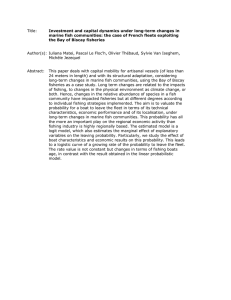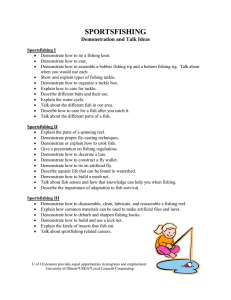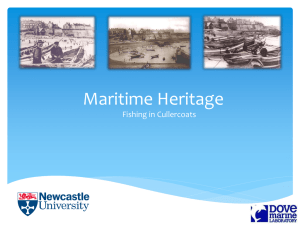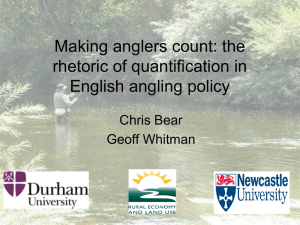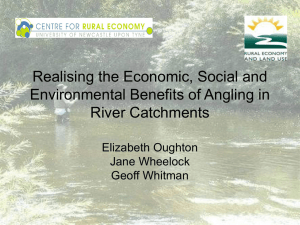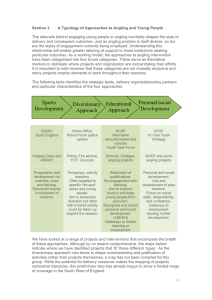Identifying barriers to participation in angling Dr. Elizabeth Oughton
advertisement
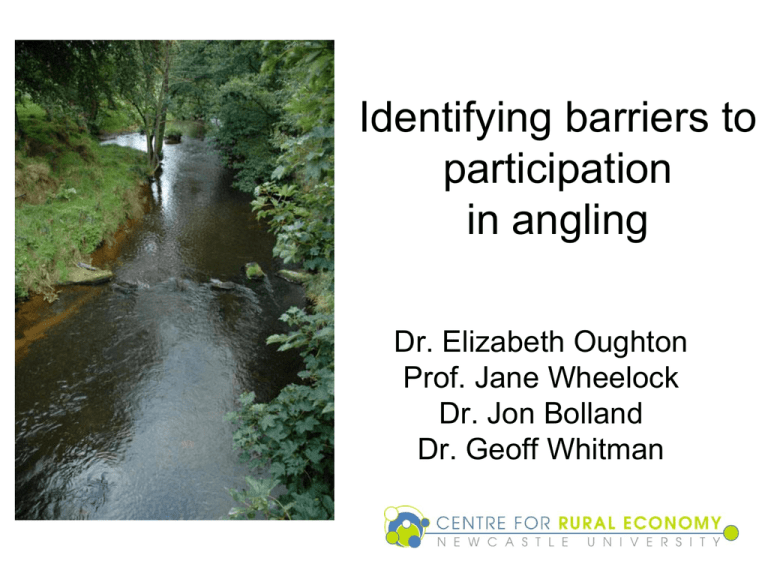
Identifying barriers to participation in angling Dr. Elizabeth Oughton Prof. Jane Wheelock Dr. Jon Bolland Dr. Geoff Whitman Angling in the Rural Environment Rivers Swale and (Yorkshire) Esk, and the Ure catchment The aim: to analyse the complex network of natural and socioeconomic relationships around angling in the river environment, including institutions of governance and land use practices at a range of interconnected scales Environment Agency Public Attitudes to Angling 2005 What factors would encourage you to go fishing? Lapsed anglers % New anglers % Having someone to go with 34 40 Lower licence fees 26 10 Knowing places to fish close to home 21 13 Places to take children 21 18 If it were easier to use local ponds/lakes 19 13 Better facilities 13 7 More people knew more about fishing 11 8 Hire or borrow tackle 11 10 More fish in rivers and lakes 9 6 Information on how to fish - 19 EA study suggests a latent demand Is it demand or supply that limits participation? How is participation restricted? Supply of angling opportunities Good variety of day fishing: small and large commercial lakes or as a part of a holiday, with a hotel, caravan or B and B Swale and Ure catchments: 59 commercial day ticket 153 stillwaters Some free places to fish on rivers Social aspects of fishing • ‘..I don’t go fishing gladly on my own even now. I’m always ringing up and asking people if they want to come with me on my stretch.’ (Esk angler) • Angling clubs vary in the extent to which they welcome members: – ‘Well if somebody who resides in the village wants to be a member and we know that he is not a drug addict or thief and whatever else, we’d welcome him with open arms’ – ‘…we’ve never had a closed membership, we’ve never, some clubs once they got to a number of members closed the membership down and wouldn’t let anybody else in or if you wanted to get in it was waiting for dead men’s shoes, … What makes a good place for fishing? Tranquillity, peace, natural environment Quiet, rural setting, wildlife, un-spoilt unpolluted 75 (36%) Fishing quality/ management Good restocking policy, variety of fish, good quality fish, good pegs 63 (31%) Access, availability of waters Access to rivers, short travel times 26 (13%) On site facilities Café, secure parking, toilets 24 (12%) Other Friendly, cost of day tickets, organised competitions 18 (8%) Total 206 What makes a bad place for fishing? Lack of tranquillity Dirty, noisy, crowded 69 (36%) Fish quality Too few/too many fish, damaged fish, little variety 36 (19%) Management of fishing environment Unsafe, crowded pegs, poor maintenance 32 (17%) Poor access 19 (10%) Poor facilities Lack of facilities, too commercial, greedy owners 16 (8%) Presence of other non anglers Dogs, kids, cyclists, boats and others not fishing 10 (5%) Other Over priced, silly rules, bad sportsmanship 10 (5%) Encouraging greater participation • Provision of a range of different types of angling opportunities • Natural environment, peace and wildlife are very important to anglers • Do not underestimate the social aspects of angling • ‘Going fishing’ doesn’t necessarily mean ‘getting away from it all’!
